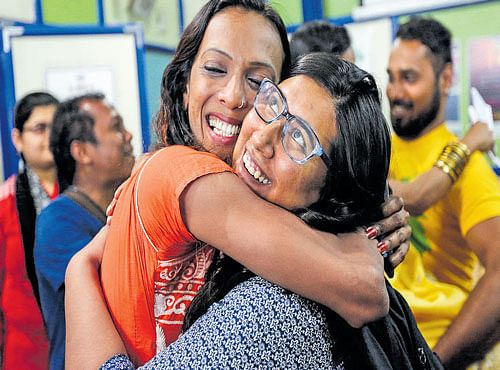
The Supreme Court on Tuesday referred to a five-judge Constitution bench a plea for de-criminalising gay sex among consenting adults, made by gay rights activists.
Those fighting for rights of lesbians, gay, bisexual and transgender community claimed present and future generations were bound by stigma and indignity in view of the penal provision.
A three-judge bench presided over by Chief Justice T S Thakur said important constitutional issues were raised in as many as eight curative petitions filed against the 2013 ruling.
The decision to refer the matter to the Constitution bench for adjudication was immediately welcomed by gay rights activists across the country as it reopened the legal debate on homosexuality.
The SC had in 2013 set aside the Delhi High Court judgment of July 2, 2009, de-criminalising gay sex under Section 377 of the Indian Penal Code. It had said only Parliament has power to quash the 1861 law, which made gay sex among consenting adults a punishable offence.
Appearing for the gay rights activists, senior advocate Kapil Sibal said: “A person’s sexuality is his or her most precious, most private of rights. Any provision that penalises an adult person’s expression of consensual sexuality in private is significantly unconstitutional.”
He also said if the judgment is not corrected, it will cause immense public injury. Sibal was supported by senior advocates Anand Grover, appearing for NGO Naz Foundation, and Shyam Divan. The argument was, however, opposed by the counsel representing All India Churches Association and All India Muslim Personal Law Board, among others.
In his brief submission, Sibal also said that the 2013 judgment of the apex court was contradictory in terms of the NALSA verdict, which recognised transgenders as a separate category and directed for treating them as OBCs, giving them reservation in jobs and admission to educational institutions.
The bench, also comprising Justices A R Dave and J S Khehar, said that the petitions raised issues pertaining to important constitutional dimension and would be adjudicated by a five-judge bench.
The court's order re-kindled hope among the LGBT community and gay rights activists. NGO Naz Foundation convenor Anjalil Gopalan said as the apex court had accepted the petitions, it meant the judges saw merit in them. Another activist Mohnish said the SC order is a progressive step in the right direction. CPI's D Raja said Section 377 of the IPC should be reviewed as all sections of society need to have equal rights.
